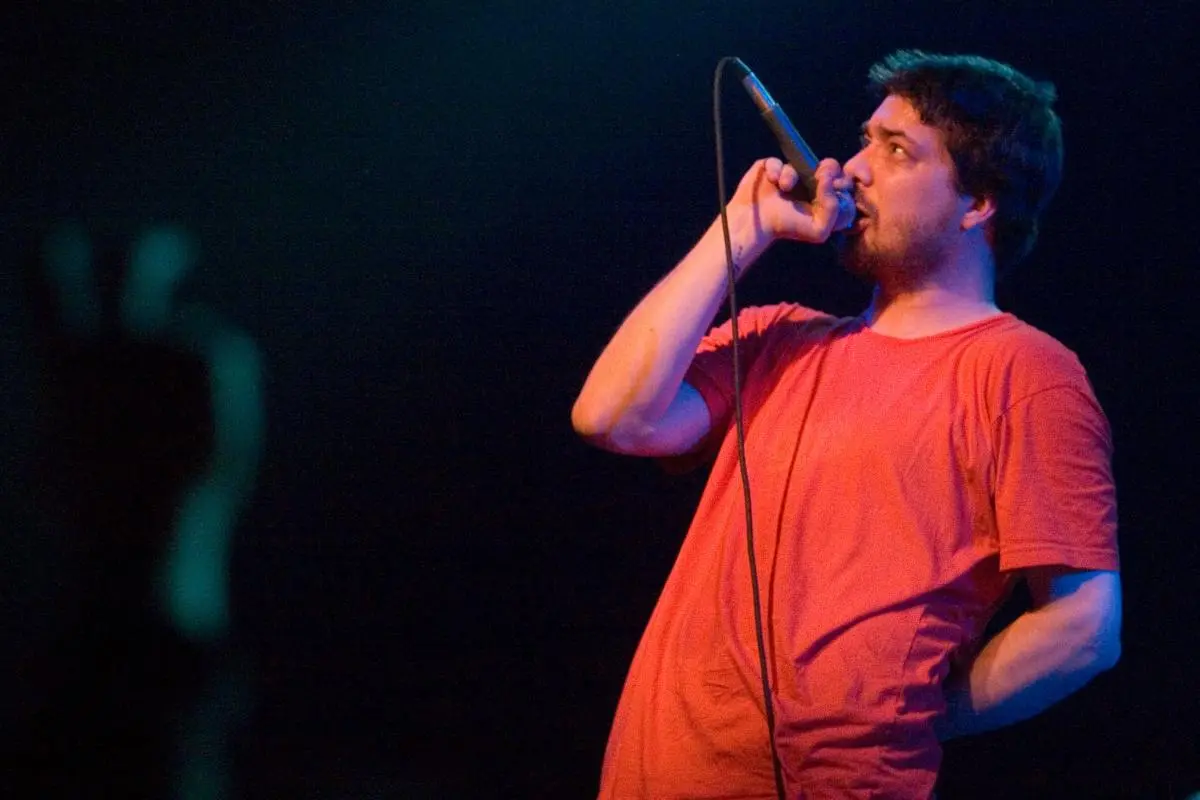In 2014, data scientist Matt Daniels analyzed a wide range of hip-hop artists in an effort to answer one pressing question: Who has the largest vocabulary in the game? Not surprisingly, renowned wordsmiths like Outkast and the Wu-Tang Clan ranked high on the list, surpassing Shakespeare’s complete works on the measure of unique words used. But one rapper’s verbal repertoire stood out from the rest: that of Aesop Rock, an obscure but beloved Portland-based artist who has been churning out insanely intricate raps since the mid-1980s. According to Daniels, Rock’s vocabulary far exceeds that of Melville’s “Moby Dick.” In fact, he notes in his study, this rapper is so far above the mean that he shouldn’t even be on the chart.
There’s really no better way to describe Aesop Rock than this: He’s an outlier. Fiercely committed to his own brand of art, his wordy, sometimes impenetrable lyrics have alienated many a potential fan. When I first listened to his latest release, “The Impossible Kid,” I pulled up the lyrics online and read along with the raps, even then pausing occasionally to decipher a particularly pithy line. To the unprepared or impatient listener, these songs might sound like a foreign language. But if you have the inclination to sit down and spend some quality time with “The Impossible Kid,” you’ll hear this record for what it is: the product of years of nose-to-the grindstone work and hard-won life experience, written and delivered by an artist whose talent rivals any of the more famed rappers on Daniels’ extensive chart.

Much of “The Impossible Kid” was conceived in an isolated cabin in the rural Oregon woods, where Rock retreated after a difficult breakup and the death of a good friend, rapper Camu Tao. Some of the album’s densest, most pensive tracks are drawn directly from this hermit-like retreat: see “Supercell,” which reads like a late-night, psychotropic journal entry thick with references to mysticism and myth. Though impressive from a standpoint of sheer verbal craft, songs like “Supercell” are just as inaccessible to the listener as the wilderness hideaway that inspired them. Rock’s spare, DIY production style doesn’t add much to the confusing mix, though it’s certainly developed and improved since his early days. Songs like this one might be more at home on a spoken-word stage – or perhaps in the pages of a poetry chapbook – than in a traditional hip-hop album. “Supercell” is emblematic of the primary criticism that Rock faces – that he operates on a plane that doesn’t offer much to anyone without direct access to his psyche.
However, this is certainly not true of all the tracks on “The Impossible Kid.” Rock’s best efforts are those that blend his self-scrutiny and deft wordplay with plain old storytelling, resulting in more accessible raps that retain all the insight of his more introspective work. When he steps out of the turmoil of his head and recounts the life experiences that set his mental maelstrom spinning, the results are stunning. One of the album’s strongest tracks is “Blood Sandwich,” a meditation on brotherhood and suburban discontent that weaves together two weighty childhood anecdotes. These are stories that most rappers might cast aside, events that the typical person might not even remember. But Aesop carefully unfurls them for the listener, squeezing every possible drop of meaning from his recollections. In “Kirby,” he shifts seamlessly between vivid detail and dark humor, assembling an ode to his beloved cat that closes with this devastating pair of lines: “15 years taking prescriptions/ Now a shrink like, ‘I dunno, maybe get a kitten?’” Equally shrewd is “Lotta Years,” a cutting reflection on age and alienation amidst the utter weirdness of millennial culture. Employing a trademark mixture of wry self-analysis and literary reference, he muses, “You should have seen me in the ‘80s / I was bumping New Edition, dragging acne into Hades.”
Should have seen him in the ‘80s? Maybe, but if Aesop Rock hasn’t yet caught your eye, there’s still time to look. After decades of personal turmoil and rabid dedication to his craft, this rapper is producing some of his best work to date. Despite pervasive criticism, he’s making as strong of a case as ever for a permanent spot in the hip-hop pantheon. In “Rings,” decidedly one of the album’s most powerful tracks, he expresses regret about leaving behind a potential career in visual art, picking apart a youth studded with missed opportunities. But the track itself – flowing flawlessly over thoughtfully assembled beats and synths, rich with the sharp insight and extensive vocabulary for which Rock is known – is a counterpoint to those doubts. Aesop Rock is not missing any more opportunities. Though at times opaque and inscrutable, “The Impossible Kid” is an achievement to be proud of – a masterpiece not necessarily visual, but certainly verbal.
Contact Clare Flanagan at ckflan ‘at’ stanford.edu.
